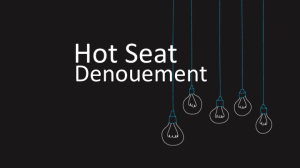Hot Seat Case #99 Denouement: 14 yo F with abdominal pain
Posted on: September 29, 2017, by : Haroon Shaukat MD
Scott Herskowtiz, INOVA Children’s Hospital
The Case:
14 year-old female presenting with acute on chronic abdominal pain, weight loss, and new onset NB/NB emesis. The acute exacerbation was going on for the past three days and she was previously diagnosed with GERD, but her symptoms did not seem to improve on Pepcid. She was recently switched to zantac. Her physical exam seemed relatively unremarkable other than mild epigastric tenderness to palpation.
Here’s How You Answered Our Questions:
Discussion:
If you went through this case it was probably no surprise to you how much of a surprise it was to the group when the laboratory results returned. Every provider in the room has had multiple patients such as this one. Nonspecific abdominal pain with a differential as long as the NYC Marathon.
However, Dr. Jennifer Chapman reminded us that in chronic problems such as this one, it is prudent for the provider to set the families expectations early. In that, most likely we will not give you an answer to what is causing this, but, hopefully point you in the right direction of someone who may be able to. Overwhelmingly, the group agreed that a Urine HCG would be the most consistent test to be done in the Emergency Department, as sending a pregnant adolescent with abdominal pain would be poor form. Imaging decisions for this patient may be institutional dependent as ultrasound has several limitations. Not only is it a user dependent mode of imaging that requires a great deal of proficiency, but, also has limited availability during certain portions of the evening at many places. Dr. Karen O’Connell brought up the fact that abdominal xrays are truly limited in their role. If one is not looking for obstruction or perforation, it is often of limited value.
Finally, the ever dreadful conversation of how emergency medicine is shifting toward the customer service industry whether we like it or not. However, Dr. Joanna Cohen graciously reminded the group that doing labs for the “sake of doing labs” is the wrong mentality to have and will inevitably add to the ever growing problem of health care expenditure. We as physicians should be mindful of health care expenses and put our feet down when we get push back from families.
Denouement:
The patient was admitted to the Hospitalist service for hyponatremia for further workup. Her TSH was noted to be 475 with a T4 that was undetectable. An ACTH stimulation test showed undetectable cortisol levels at 30 and 60 minutes. Additionally, she had low post-menarchal estrogen levels. She was started on levothyroxine and hydrocortisone. Her kidney function and hyponatremia normalized after treatment. She was ultimately diagnosed with Autoimmune Polyglandular Syndrome Type 2 (previously called Schmidt disease).
https://www.ncbi.nlm.nih.gov/pmc/articles/PMC4437097/pdf/jcdr-9-OD01.pdf
The information in these cases has been changed to protect patient identity and confidentiality. The images are only provided for educational purposes and members agree not to download them, share them, or otherwise use them for any other purpose.
